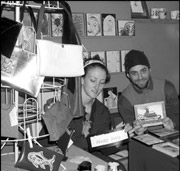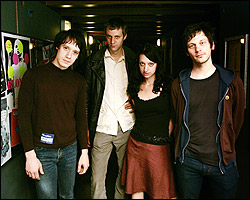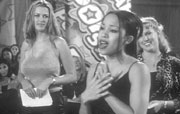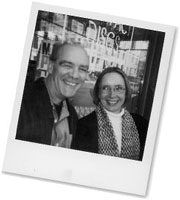RUMMAGE
Nation, 1921 Fifth Ave., 206-374-9492, noon-4 p.m., first Sunday of every month
I’M NOT OLD-FASHIONED, but I like things that are. I like ships coming in to port with raw materials, and I like trains leaving town with processed goods. I like mom-and-pop grocery stores. I like buying produce from the woman who grew it, and I like buying fish from the guy who caught it. I like that public markets still exist in our Old Navy eBay culture, and I like that on the first Sunday of every month, 30 or so local artists put a new spin on that old-fashioned marketplace idea by transforming a downtown restaurant, club, and bar into a combination artists’ network, midday party, and art sale called Rummage.
As shoppers weave through the three aisles of tables that render Nation’s dance floor a minimall of the most excellent sort, vendors and artists bob their heads to the vintage Prince songs executed by the afternoon’s DJ. The restaurant’s staff balances trays of brunch food and Bloody Marys. The monorail races by the large picture windows and flares of sunshine cut through the air, as laughter, bargaining, and chitchat create the happy din of a free enterprise economy with an edge. And I like it.
Started one year ago by local style and arts maven Gia Bahm, Rummage is a never-the-same-twice collective of Capitol Hill-minded craftsmen and entrepreneurial artists. Bahm dreamt up Rummage while she was working at I-Spy, the club adjacent to and owned by the same proprietors as Nation. When Bahm moved to New York this fall, the organizational tasks were taken over by two Rummage participants, Matthew Parker and Sam Trout. Each month, Parker and Trout make sure there are 30 artists for the 30 available table spots (rental fee: 10 bucks), a DJ for ambience, and plenty of artfully generated flyers promoting the show. And the rest just sort of happens.
Parker, a classical painter, comments that many local gallery curators and shop owners use Rummage as a source for new wares. “The owners of Damsel [a downtown collective that offers the work of L.A., N.Y., and Northwest artists] came to Rummage and picked up a bunch of stuff,” Parker reports. “Lauren Holloway’s belt buckles sold there and then she ended up curating their grand opening show, ‘Unbuckled.'”
Gina Tolentino, whose felt flower accessories are girly, sweet, and funky, too, began selling at Pretty Parlor on Phinney Ridge after getting started at Rummage. As more and more of these collectives spring up around town, and as the dozen or so local stores (Lipstick Traces, Atlas Clothing, Double Trouble, and others) that already carry locally made products of this variety gain wider popularity, this opportunity for artists is huge.
At Rummage, you can find beautifully stylized handmade jewelry, rock ‘n’ roll-themed accessories, T-shirts silk-screened with an iconic and ironic image of Jesus Christ, vintage sweaters appliqu餠with faux-fancy handmade flower patches, junk culture refrigerator magnets, neo-deconstructionist fashion, found-object knickknacks, and—perhaps most importantly—a community.
Debbie Reichard, a New Jersey native who came to Seattle to attend the University of Washington’s MFA program, affixes images, decals, and phrases of her own design onto thrift store ceramic mugs and refires them, giving them an entirely new life. Reichard, also a sculptor and musician, calls the process “clobbering.” “I loved seeing the shiny white generic cup come out of the kiln with my alteration,” Reichard says, “an American flag waving and the words ‘I Am Taking Drugs’ on it.” (They sell for about 10 bucks each.)
Like most of the art at Rummage, Reichard’s mugs have a twist—a sarcastic tone or an oblique reply—and an oddly touching sense of humor and warmth as well. Jasmine and Jacob Deatherage make blank-paged journals and sketchbooks out of beautiful vintage book covers. Antique Winnie-the-Pooh volumes, old crime novels, and odd, funny How-To manuals are stripped of their stories, stuffed with quality blank paper, and bound together by the Deatherages’ trademark black plastic spiraling. Their table is like a recycled library waiting to happen.
Under the name Miss Skelly Jelly, Anna McCallister creates bright and beautiful handbags out of place mats and other random materials. “My bags range from eight to 35 bucks,” she says. “I try to keep it so that people who work hard like me can afford a foxy little handbag or accessory.”
That’s the spirit behind Rummage. Some of the Sunday artists hold fine art degrees and have considerable installment and gallery experience; others have only been experimenting on their kitchen tables up until now. What unifies them is the urge to produce usable art that their peers, and the rest of us, can afford.
This Sunday there will be a special holiday edition of Rummage. If you’d like to get involved with Rummage, e-mail iheartrummage@hotmail.com.









